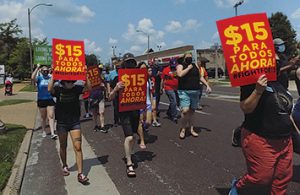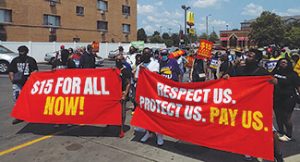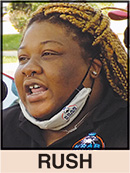After 12 years without raise, activists demand a $15 minimum wage for ALL
By TIM ROWDEN
Managing Editor

Fast-food and low-wage workers in St. Louis and across the country went on strike last week to mark the 12-year anniversary since the federal minimum wage was raised.
Twelve years of rent going up.
Twelve years of paying more for groceries.
Twelve years of the cost of everything increasing, except the price of their labor.
As the economy struggles to recover from the COVID-19 pandemic, workers with Show-Me $15 joined with Fight for $15 activists across the country July 20 to demand Congress and restaurant companies like McDonald’s, Burger King, Wendy’s and others raise minimum pay to at least $15-an-hour.

Additional strikes and rallies took place in Montgomery, Ala., Detroit and Flint, Mich., Asheville, Charlotte and Durham, N.C., Tulsa, Okla., Charleston, S.C., Houston, Texas, Norfolk, Va., and Milwaukee, Wis. Restaurant workers with One Fair Wage held protests in New York, Washington, D.C., Chicago and Nashua, N.H.
In St. Louis, fast-food workers, were joined by SEIU Local 1 janitors and other community leaders, including state Senator Karla May (D-St. Louis), for a rally outside the McDonald’s at 4006 Lindell Blvd. and gathered later in the day at Krab Kingz on The Loop to demand a minimum wage for at least $15-an-hour for all workers and the right to form a union.
Twelve years is the longest gap in history between increases in the federal minimum wage. And for tipped workers, it’s even worse, as the sub-minimum tipped wage has been stuck at $2.13-an-hour for 30 years!
 “The federal minimum wage of $7.25-an-hour wasn’t enough to survive in 2009, and it’s definitely not enough for workers to recover from this pandemic,” said Cathy Sherwin, McDonald’s worker who was forced to take a fast-food job after a battle with cancer forced her to retire from her communications job.
“The federal minimum wage of $7.25-an-hour wasn’t enough to survive in 2009, and it’s definitely not enough for workers to recover from this pandemic,” said Cathy Sherwin, McDonald’s worker who was forced to take a fast-food job after a battle with cancer forced her to retire from her communications job.
“We’ve seen corporations give CEOs multi-million-dollar bonuses – during a pandemic – all the while telling workers like us they can’t afford to pay us a living wage,” Sherwin said.
“That’s a slap in the face to workers who put our health and safety at risk working on the front lines of the pandemic. We know they can afford it – our movement has already won billions of dollars in raises for millions of workers in more than 40 cities and 10 states. If we can make corporations like McDonald’s pay $15-an-hour in those places, they can pay $15-an-hour everywhere. They could do it tomorrow, if they wanted, but they won’t unless lawmakers in Washington make them.”
‘WE’RE GOING TO BE A UNION’
Even as cities, states and some corporations across the country have raised wages to $15-an-hour. Black and brown workers in St. Louis have been left behind because of state preemption laws that block local governments from boosting pay, as well as the U.S. Senate’s failure to act on raising the minimum wage.
 “If this is your first strike, please, don’t let this be your last,” said Frances Holmes, 58, a veteran Show-Me $15 activist. “Speak with your coworkers, your friends, your families. Anybody who works a low-wage job can be out here with you, not just McDonalds. I have worked in fast-food for a long time. I can remember when the minimum wage went to $7.25, that was 12 years ago. When I started working at the tender age of 13, the minimum wage was $3.75.
“If this is your first strike, please, don’t let this be your last,” said Frances Holmes, 58, a veteran Show-Me $15 activist. “Speak with your coworkers, your friends, your families. Anybody who works a low-wage job can be out here with you, not just McDonalds. I have worked in fast-food for a long time. I can remember when the minimum wage went to $7.25, that was 12 years ago. When I started working at the tender age of 13, the minimum wage was $3.75.
“It’s not feasible for someone to live on the minimum wage,” Holmes said. “I can’t afford a car so I ride the bus to and from work each day. I live with my granddaughter and her son, my great grandson. And during the pandemic, I worried about the risk that as being an essential worker I could bring home a deadly disease to my granddaughter and her baby. But I worked anyway through the pandemic, because if I didn’t, we wouldn’t have a place to live.
“I’m on strike today with other workers across the country to show that we are here, united. We walk like a union and eventually we’re going to be a union.”
 ‘IT’S OKAY TO STAND FOR SOMETHING’
‘IT’S OKAY TO STAND FOR SOMETHING’
“I have worked in different restaurants all over. And it’s sad to say, they’re all the same,” said Nicole Rush, a Show-Me $15 activist who works at Krab Kingz in The Loop.
“The disrespect, the lack of benefits, the low pay. I work every day, all day. When I leave for work, my kids are asleep. When I come home, most nights, they’re asleep. On the days that my three-year-old catches me before I walk out the door, he begs me ‘Mommy, please don’t leave.’ and it breaks my heart, but I have to leave.
“I have to work so their life won’t be like mine,” Rush said. “I want my kids to know that it is all right to speak up and speak out and fight. I want my kids to know that it is okay to stand for something, and I want them to know that I stand for something.”
‘OUR CHILDREN ARE RAISING THEMSELVES’
That sense of determination and solidarity is woven throughout the Fight for $15.
 “We are strong in number, but we need $15,” said Elinor Simmons, a home care worker in St. Louis.
“We are strong in number, but we need $15,” said Elinor Simmons, a home care worker in St. Louis.
“We want to be able to live comfortably. These big businesses and companies, they are living more than comfortably. They have a cushion that they can fall on, what do we have? We have just hard work and sweat. And $15 is still not enough to meet our obligations, but it is a start. The wages are still too low to make it in this world. We have housing. We have childcare, we have healthcare. We have to have food, clothing all of that. And $15 is still not enough. But we can start there. That would help. So we can make our lives better. So we wouldn’t have to work two or three jobs just to make it. Our children are raising themselves, because where are we? We’re at work. That’s not right. Children need structure, they need their parents to guide them. We need to let it be known to our elected officials up in Jefferson City, up in Washington, that we are not going to give up. We are not going to stop until you give us $15 and a union.”
Increasing the minimum wage to $15-an-hour would boost the incomes of 32 million workers, including 59 percent of working families with incomes under the poverty line. Nearly one-third of Black workers would receive a raise. One out of four workers who would benefit are Black or Latina women.
ADD YOUR VOICE
Workers with the Fight for $15 and a Union have been demanding a raise since long before the pandemic as part of a movement of fast-food cooks and cashiers led largely by Black and brown workers. Since 2012, when 200 fast-food workers walked off the job in New York City, the movement has won tens of billions in raises for tens of millions of workers, passing $15 minimum wage laws in 10 states and putting more than 43 percent of the country on the path to $15.
In April, President Biden signed an executive order raising the minimum wage to $15-an-hour for federal contractors and subcontractors, putting an additional 390,000 workers on the path to $15.
You can add your voice to the Fight for $15 by calling 888-639-5155 to tell your senators to #RaiseTheWage for ALL.



Leave a Reply